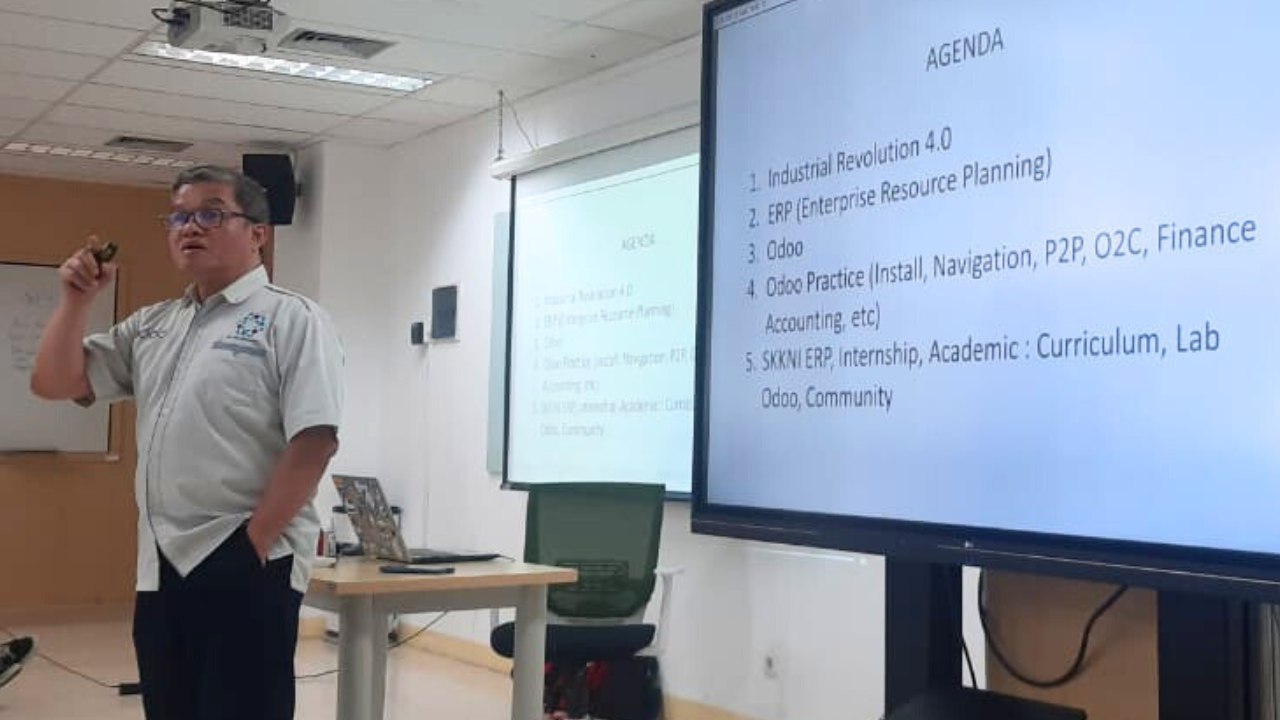In the current digital era, many applications and technologies have been proven to make business activities easier. Business people or companies that successfully implement technology in their daily operations tend to develop and progress more quickly.
The application of technology in the business world was discussed at a guest lecture on Corporate Resource Planning presented by the Founder & CEO of PT. Ctech ERP Indonesia, Dr. Ir. Agung Terminanto, MBA, IPM, CEA, CEL at SBM ITB on Sunday (24/9).
Ctech ERP has created quite a phenomenal piece of software, namely Odoo. In this class, Agung discussed many topics regarding navigation and digital business travel with the implementation of Odoo ERP.
Generally, as time passes, the industrial world develops slowly and becomes more sophisticated. We are currently in the industrial revolution 4.0 phase, where the main characteristic is the seamless integration of physical and digital systems.
Real examples include the use of technology in the form of the Internet of Things (IoT), the presence of big data and analytics with CPS, as well as smart devices to connect and communicate with each other or with human operators. This integration enables data exchange and real-time decision-making.
The sophisticated industrial conditions enable many business people to enter the market. So, we must understand the surrounding conditions using the VUCA framework. This framework serves as a tool for understanding and addressing emerging challenges and opportunities in today’s dynamic and complex world.
Great VUCA consists of volatility, uncertainty, complexity, and ambiguity. To understand and overcome the problems that appear from VUCA, each existing element must be given a solution.
Volatility should be addressed by formulating a strong vision, uncertainty can be resolved through a deep understanding of the surrounding environment and the market, complexity can be managed by ensuring clarity and originality in information and data, and ambiguity can be controlled by embracing agility and adaptability. Furthermore, when viewed in a broader context, Industry 4.0 typically demands extensive and flexible collaboration.
Seeing the needs and increasingly dynamic industrial market influences the operational complexity of the business. That’s why a system called ERP emerged. ERP, Enterprise Resource Planning, is a comprehensive and integrated software solution organizations use to manage and simplify various business processes and functions. ERP systems facilitate the flow of information and data across various departments and functions within an organization, encouraging efficiency, collaboration, and data-driven decision-making. It offers several benefits, including increased efficiency, reduced operational costs, increased data accuracy, simplified processes, and increased department collaboration.
Odoo, according to Agung, is a product or real form of an ERP system. Odoo is management software with an all-in-one concept that directly connects the company with the customer.
This software consists of various connected applications, including sales, finance, operations, manufacturing, human resources, marketing, customization, and websites. Each of these divisions has several programs or activities facilitated by Odoo.
For example, system solutions for the manufacturing sector with ERP Odoo include manufacturing planning, billing material lists, minimum stock rules, inventory and manufacturing analysis, analytical reporting, productivity analysis, working time and machine downtime, process control, and quality control.
“Odoo is software that integrates all applications, of course the ERP system in Odoo carries out Front to Back End Integration, from the Point of sales to the e-commerce platform and finally produces sales that are recorded in the system,” said Agung Terminanto.




